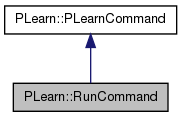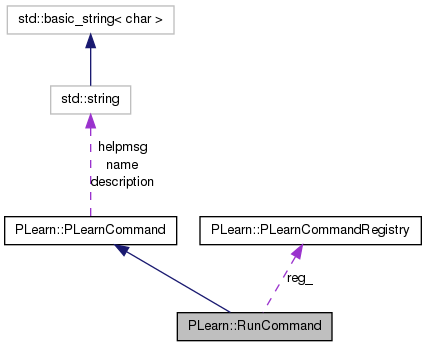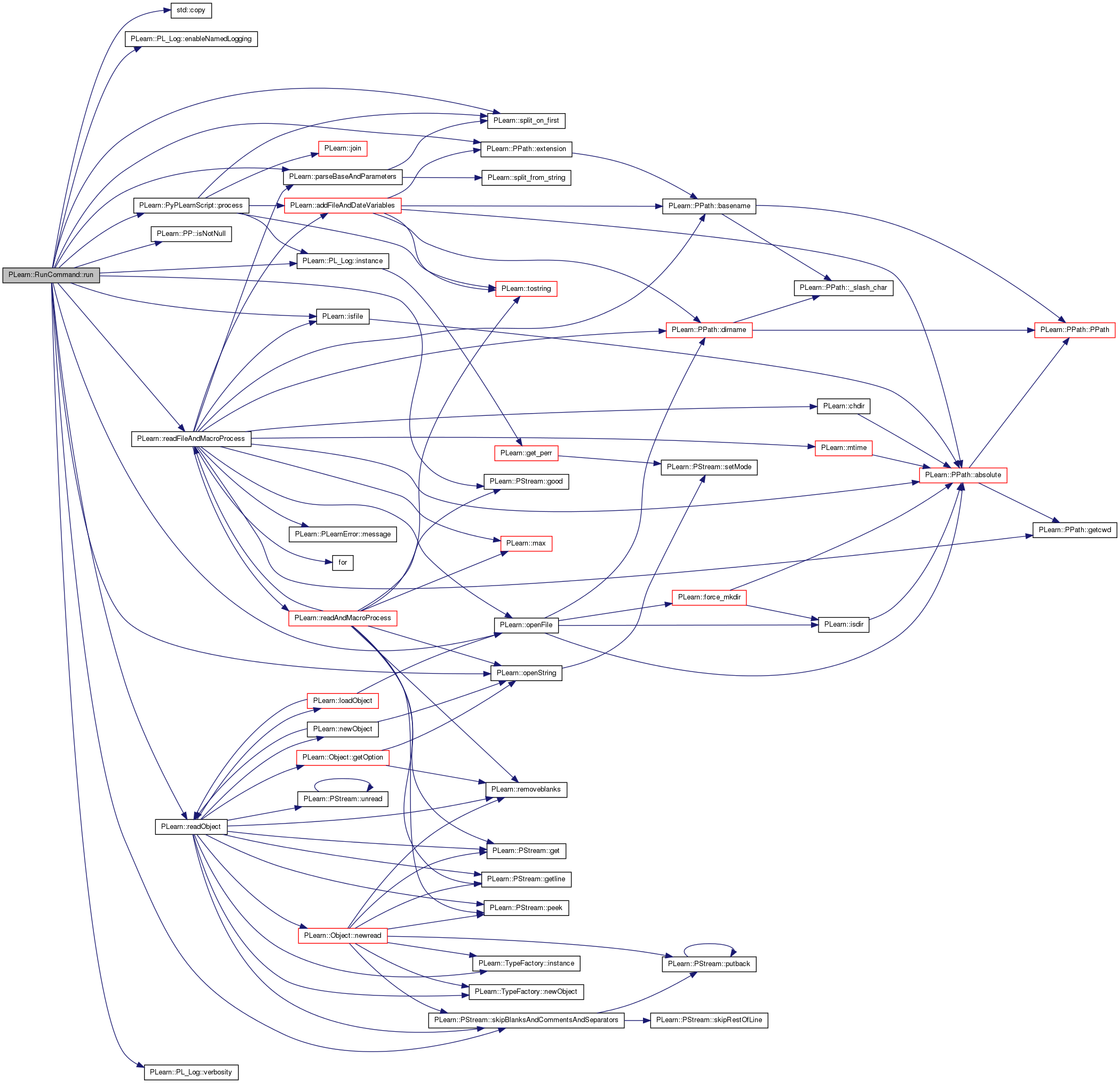|
PLearn 0.1
|
|
PLearn 0.1
|
#include <RunCommand.h>


Public Member Functions | |
| RunCommand () | |
| virtual void | run (const vector< string > &args) |
| The actual implementation of the 'RunCommand' command. | |
Static Protected Attributes | |
| static PLearnCommandRegistry | reg_ |
| This allows to register the 'RunCommand' command in the command registry. | |
Definition at line 50 of file RunCommand.h.
| PLearn::RunCommand::RunCommand | ( | ) | [inline] |
Definition at line 53 of file RunCommand.h.
:
PLearnCommand("run",
"runs a .plearn script",
"run <script.plearn> [ argname1=val argname2=val ... ] \n"
"Runs a .plearn script, with the arguments defined as\n"
"macro variables, accessible from within the script as ${argname} \n"
"'run' is what gets called when you give NO command name, but a valid .plearn script \n"
"Lookup plearn help scripts for more info on scripts. \n"
)
{}
| void PLearn::RunCommand::run | ( | const vector< string > & | args | ) | [virtual] |
The actual implementation of the 'RunCommand' command.
Implements PLearn::PLearnCommand.
Definition at line 63 of file RunCommand.cc.
References std::copy(), PLearn::PL_Log::enableNamedLogging(), PLearn::PPath::extension(), PLearn::PStream::good(), i, in, PLearn::PL_Log::instance(), PLearn::isfile(), PLearn::PP< T >::isNotNull(), PLearn::openFile(), PLearn::openString(), PLearn::parseBaseAndParameters(), PLearn::PStream::plearn_ascii, PLERROR, PLearn::PyPLearnScript::process(), PLearn::readFileAndMacroProcess(), PLearn::readObject(), PLearn::PStream::skipBlanksAndCommentsAndSeparators(), PLearn::split_on_first(), and PLearn::PL_Log::verbosity().
Referenced by PLearn::AutoRunCommand::run().
{
const vector<string>* the_args = &args;
vector<string> args_augmented;
PPath scriptfile = args[0];
if (!isfile(scriptfile)) {
// There is no file with this exact name. Maybe there are parameters
// appended to the name?
string base;
map<string, string> params;
parseBaseAndParameters(scriptfile, base, params);
if (!isfile(base))
PLERROR("Non-existent script file: %s\n",scriptfile.c_str());
// Add new arguments.
args_augmented = args;
map<string, string>::const_iterator it = params.begin();
for (; it != params.end(); it++)
args_augmented.push_back(it->first + "=" + it->second);
the_args = &args_augmented;
scriptfile = base;
}
string extension = scriptfile.extension();
string script;
PP<PyPLearnScript> pyplearn_script;
PStream in;
if (extension == "pyplearn")
{
// Make a copy of args with the first argument (the name of the script)
// removed, leaving the first argument to the script at index 0.
vector<string> pyplearn_args(the_args->size()-1);
copy(the_args->begin() + 1, the_args->end(), pyplearn_args.begin());
pyplearn_script = PyPLearnScript::process(scriptfile, pyplearn_args);
script = pyplearn_script->getScript();
// When we call the pyplearn script with either
// --help or --dump, everything will already have been done by
// the time the PyPLearnScript is built.
if ( script == "" )
return;
PL_Log::instance().enableNamedLogging(pyplearn_script->module_names);
PL_Log::instance().verbosity(pyplearn_script->verbosity);
in = openString( script, PStream::plearn_ascii );
}
else if(extension=="plearn") // perform plearn macro expansion
{
map<string, string> vars;
// populate vars with the arguments passed on the command line
for (unsigned int i=1; i<the_args->size(); i++)
{
string option = (*the_args)[i];
// Skip --foo command-lines options.
if (option.size() < 2 || option.substr(0, 2) != "--")
{
pair<string, string> name_val = split_on_first(option, "=");
vars[name_val.first] = name_val.second;
}
}
script = readFileAndMacroProcess(scriptfile, vars);
in = openString( script, PStream::plearn_ascii );
}
else if(extension=="psave") // do not perform plearn macro expansion
{
in = openFile(scriptfile, PStream::plearn_ascii);
}
else
PLERROR("Invalid extension for script file. Must be one of .pyplearn .plearn .psave");
while ( in.good() )
{
PP<Object> o = readObject(in);
o->run();
in.skipBlanksAndCommentsAndSeparators();
}
if ( pyplearn_script.isNotNull() )
pyplearn_script->close();
}


PLearnCommandRegistry PLearn::RunCommand::reg_ [static, protected] |
This allows to register the 'RunCommand' command in the command registry.
Definition at line 69 of file RunCommand.h.
 1.7.4
1.7.4